Talking to music veterans about music is entertaining and painful at the same time. You learn things you had no idea about but, at the same time, you don’t know where to start and how to wrap up. The topics covered are growing and you feel like it would be a shame to shape the interview. An interview with the legend of Czech jazz Jan Dalecký confirmed this one hundred percent. If the name confuses you, he was formerly known as Jan Beránek. I did ask about the change, by the way.
In an interview in 2001 you said that all musicians in Brno know each other and everybody can perform with just about anybody, but there was no band that would exist for a few years and shape its expression. Has anything changed since?
There was a vacuum for many years. I am 72 now, my bandleader from the old days Milan Kašuba is 74. Our guitarist Jirka Adam would have been 70. We were a very special age category because we were just steps from retirement and there was nobody younger to replace us. There were no promising followers for fifteen to twenty years. Maybe there were some, but they left Brno. The situation started to improve after 2000 when some big talents emerged. Around the turn of the century there was a student at JAMU Pavel Wlosok but he moved to the States to study. Vilém Spilka, thirty years my junior, was an unknown name to me back then, but he was in his rock stage anyway. A new generation of musicians came with the birth of JazzFestBrno.
 What happened? Did the conditions for playing jazz change? Do they have clubs to play at or does somebody pay them better?
What happened? Did the conditions for playing jazz change? Do they have clubs to play at or does somebody pay them better?
The conditions have not changed that much. There is no permanent club with bi-weekly shows. Every once in a while somebody organises an event but there is no permanent programme, just like in the Ornis club in the late 1960’s and early 1970’s. I know that some musicians go from one venue to another; some of them are really bizarre. There is no permanent jazz club because it would not generate a profit. Anyone wishing to give it a try must know that the proceeds from the sale of tickets cannot even cover the performer’s fee, let alone any profit. Some of them might try it out of the goodness of their hearts and they quickly back out, as soon as they start losing money instead of making it.
How come the number of jazz musicians is increasing?
I would like to know that too. The annual summer jazz workshop has been organised since 1984 as a good source of motivation to rookie jazz musicians. They can spend a week under the watchful eye of our best lecturers in the field of trumpet, sax, trombone, guitar or piano. I had a string class. A talented musician can improve in one year and become a lecturer in three. By now they are the middle or older generation. It may not hurt to sit down with some of these musicians as reference samples and think about the development. There are a couple of them and it is even better thanks to the Department of Jazz at JAMU. Only a few of them hail from Brno but posses are starting to form around them. For example Radim Hanousek has his own posse and so does Vilém.
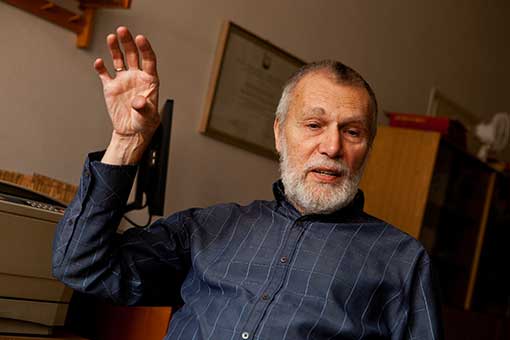 Josef Blaha once composed and dedicated to you a piece called Pochod jazzové policie (Jazz Police March). What have to done to deserve this label?
Josef Blaha once composed and dedicated to you a piece called Pochod jazzové policie (Jazz Police March). What have to done to deserve this label?
During my mandatory army service I started collecting factual information on new albums based on information published in Downbeat magazine where they have had this column ever since I can remember. I had been a subscriber since 1965 and I also purchased older issues. I was lucky to collect almost complete volumes until 1954. I created a card for each reviewed album. There was the name of the album, the performer, label, reference number, participating musicians or a short description. It has grown so much it would be a pity to throw it out. The archive takes up two large A7 sized drawers. I donated the magazines, 50 volumes worth taking up three metres of a bookcase shelf, to the Department of Musicology. I knew about recent developments or new releases and discographies. Of course I did not have all the data in my head but I did know where to find it. I discovered many factual errors in the work of Orchestr Gustava Broma (Gustav Brom Orchestra). Once I even wrote a very daring latter to Gustav Brom. In it, I analysed his new album and pointed out all numerous mistakes in the track names, names of authors etc. He sent me a very polite letter, asking me to keep doing what I was doing. That is how I earned the nickname “jazz policeman”, hence the name of the piece. I have a colleague in the Ostrava radio named Jiří Greinecker whose database is even better.
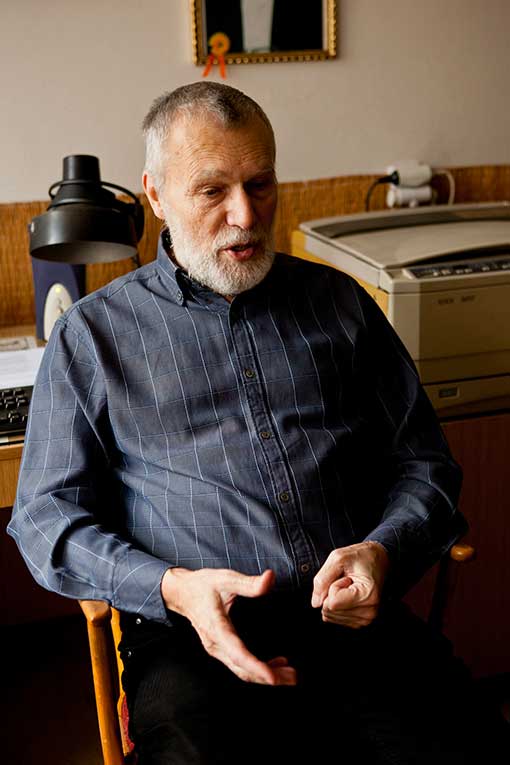 Are you following the contemporary jazz scene? Any favourite musician?
Are you following the contemporary jazz scene? Any favourite musician?
I still subscribe to Downbeat but I no longer make those cards. I stopped doing that in 1995. I was no longer willing to devote so much time to that activity. Plus, records were mixing with CD’s and that was not supposed to happen. They never should have stopped making records... I’m kidding, of course. I like CDs because of the better sound and practicability, but having two different formats in a database is complicated, it has its undeniable cons. And thanks to the Internet you can find any information much faster. Mind you, there are even better sources than Wikipedia. One word: discogs. Just enter somebody’s name and you can browse through their entire discography with all editions and versions. Popular albums, such as The Beatles’ Magical Mystery Tour, are listed in hundreds of versions.
How do you like the line-up of the next year’s JazzFestBrno – Bobby McFerrin, Chick Corea, Dianna Reeves… Pretty good, eh?
Now that is going to be a blast! I like McFerrin and Corea’s album. These two are masters; they are really clicking without saying a word. Dianna Reeves is a modern-day Sarah Vaughan who was my favourite singer. I even met her in person. It was in a sold-out Lucerna and when the concert was over she asked for song requests and I yelled “Misty”. My wish was not granted and she asked for other suggestions and eventually sang something else... but I was the first person out of all the people there who spoke to her. Thanks to JazzFest many people will find out that this music style is cherished in Brno where it is played – because Vilém has a few venues. So it may well attract new fans.
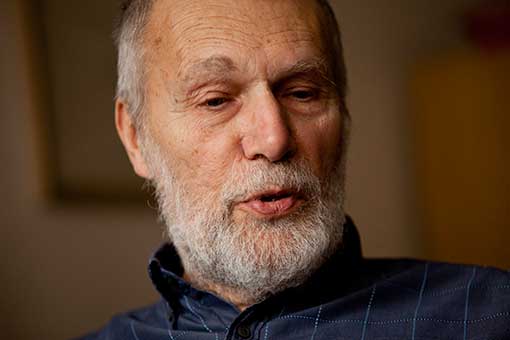 What is there to say about the everyday jazz life – Alterna, Stará Pekárna, MusicLab. Is it too much, or not enough, is it even worth listening to?
What is there to say about the everyday jazz life – Alterna, Stará Pekárna, MusicLab. Is it too much, or not enough, is it even worth listening to?
It is the result of the admirable and long-term work of Jirka Švéda because he organises complete tours for bands. He can schedule ten clubs in two weeks, attracting hundreds if not thousands of people altogether. Some people may find out how great jazz is, and they are hooked. Next time they will find their favourite performer in the clubs programme. Just like I do. I don’t go to all the shows.
How would your old-school bands like Ch.A.S.A. or Ornis enjoy this arrangement?
We would have enjoyed it. That being said, back then the demand was bigger because we were isolated. Ironically, the Velvet Revolution resulted in a falling demand for the formerly illegal things because of the newly founded civil liberties. All of a sudden everything was available and people would only go to McFerrin’s concerts. I think the situation in Prague will be different because there may be some twenty clubs with a daily programme. Last time I was in Prague I went to Chick Corea’s and Garry Burton’s concert three years ago. I only go there to see my biggest favourites.
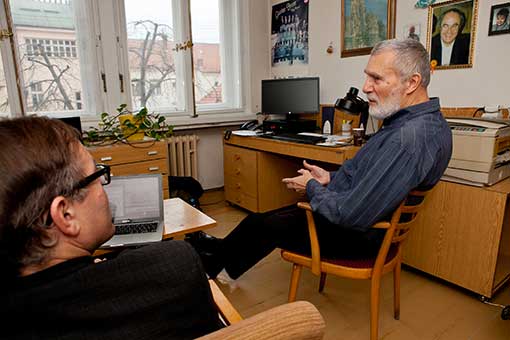 You are a part-time presenter for Czech Radio and you teach at the Janáček Academy of Music and Performing Arts and at the Department of Musicology of the Faculty of Arts of Masaryk University...
You are a part-time presenter for Czech Radio and you teach at the Janáček Academy of Music and Performing Arts and at the Department of Musicology of the Faculty of Arts of Masaryk University...
…and at the Brno University of Technology.
What do you teach at VUT?
The same seminars as everywhere else. They have introduced audio engineering as a field of study. The graduates should be able to work in music studios and in music directing, they are expected to be educated in music in general. So Dr. Schnierer teaches them the history of music in general and the history of popular music, while I teach them the history of jazz. They also have lectures in music theory so that they can express themselves. More often than ever before, the present-day studio staff does not include a director and a technician. There is one person who can be both. So they will have a degree in working the mixer but at the same time they must be able to recognize that the bassoonist started too early. They must be able to express themselves and to read notes. So now I have ten hours of lectures per week and preparation also requires some time because I hate to be unprepared in class. My students read and listen a lot, which is good. All authorities in the business say so. Some of them probably listen more than necessary.
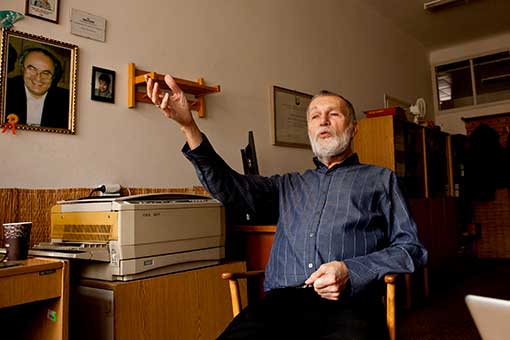 What did the Gustav Brom Orchestra mean within the context of Brno, Czech and European jazz?
What did the Gustav Brom Orchestra mean within the context of Brno, Czech and European jazz?
What they were doing was European-class jazz but they did not get the fame they deserved because of the Iron Curtain. On the other hand, the isolation had its pros – he would have had more accidents because of the frequent travelling. One accident in 55 years is impressive, but Pepík Blaha did not survive it. The stars who were visiting Brom in Brno knew very well how big a star he was, and the entire band for that matter, but they did not have the opportunity or ability in the field of promotion to convince others. But whenever Brom would arrive at a festival or perform at swing evenings in Germany, success was guaranteed. In particular,, in the late 1960’s and the early 1970’s the orchestra would frequently place fifth or seventh in the world in the critics poll of the Downbeat magazine. The people who meant something in the jazz world knew all about him.
How was Brom’s orchestra different from Karel Vlach’s, for example? They were both founded around the same time and you could say one big band is like the other…
I think Brom’s style was more distinctive. Vlach preferred carbon copies of Glenn Miller or Benny Goodman. Sure, they were first-class stars worth the inspiration, but all Vlach did was perform the copies. On the other hand, Brom teamed up with authors who wanted to do it their own way and they were individuals. When Brom’s orchestra played pieces by Blaha, Hnilička, Blatný or Audes at festivals, you could tell the difference immediately.
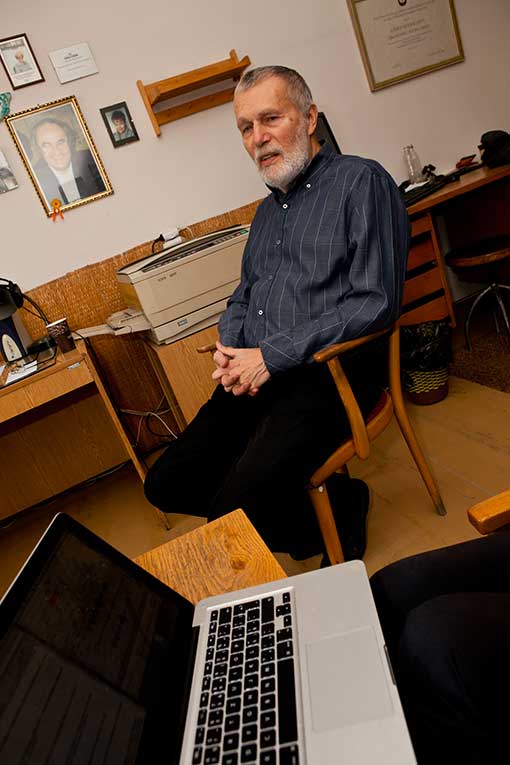 Do you still perform actively?
Do you still perform actively?
Rarely. I play jazz twice a year, plus there are some occasional art exhibitions and old music maybe three to four times a year.
You used to play in the Brno State Philharmonic.
That was long time ago. Having spent almost thirty years there, I quit in 1994 and I never came back. I have no regrets. I was 52 back then, which means “too old” for most employers. I knew that a school of music was my last chance. If I didn’t like it, I would have nothing. Luckily I came to a good school and I had no nightmares with one exception which convinced me that I had made a good decision. In this dream, we were visiting some town with the philharmonic and I met Hnilička and Bártek from Brom’s band and they are like “What are you doing here, come with us to our rehearsal”. So I went with them and we came to a different hall and the bandleader goes “Good thing you are here, I need you to perform with us tonight”. I said “I can’t, I am here with the philharmonic”. And he goes “Quit complaining, you’ll get our tux and I’ll see you tonight”. And so in this dream I quit the philharmonic and joined Brom’s band.
When it comes to jazz, the violin is most commonly associated with the interwar sweet jazz and Stéphane Grappelli. Jean Luc Ponty even played with Frank Zappa.
He had an excellent engagement and he stayed in the States. He is still number one for me. The violin had been a staple in jazz long before New Orleans jazz was introduced. And some of the bands’ leaders were violinists. They would stand in front the band and conduct using the fiddlestick. They disappeared with the boom of New Orleans jazz because the trend was different. But the line of jazz violinists was not broken. It has been amazingly long. In 1983 I was approached by Martin Zbrožek who is the best Czech jazz violinist. Back then he was a senior at the conservatory in Teplice, working on a thesis on jazz violinists. He had zero knowledge of the subject; he only accepted the topic because he liked the music. He visited me frequently to collect information. We ended up working on the thesis together. I realised there were some 60 jazz violinists who meant something. Sixty seems like a big number, until you realise that there are 6,000 trumpeters. There is a separate category for violinists at award shows but only a handful of albums are recorded.
 Do you know any present-day acoustic combo with the violin or is the contemporary jazz played solely on the electrified violin?
Do you know any present-day acoustic combo with the violin or is the contemporary jazz played solely on the electrified violin?
I think only old-school violinists who perform pre-swing 1920’s still use the violinophone which is noticeably louder. But other than that, ever since the introduction by Stuff Smith in the 1930’s the stick is used. We also had an acoustic string quarter Nostalgia that played without amplification. We had occasional fights with sound technicians who wanted to fix our sound equipment at all costs. I chased them away arguing that we do not need 140 db as the human ear is capable of hearing an admirable scale of sounds and people can listen to quiet music once in a while.
How did Jan Beránek become Jan Dalecký? Did you need a change like changing apartments?
I divorced my wife and I wanted to sort of cut off the past. My children approved and accepted it. I have also undergone a certain “renovation”: I have an artificial aortal valve so I was born again. This is my new life isolated from the previous one.
In France, the symbolic violin relay baton was handed over from Grappelli to Ponty and then to Didier Lockwood. Can you think of anyone you would give your violin to?
I don’t know, it is no Guarneri…
Regardless of the brand, what I meant is “would you give it to anybody”?
I don’t know. Maybe one day when I know I cannot hold it anymore. At least I still know left from right. I grab the violin with my left hand and the stick in the right hand.
PS: Two weeks ago on Friday I went to Vienna to play the viola. And on Sunday I recorded three Christmas songs with Petra Jungmanová, also as a violist.





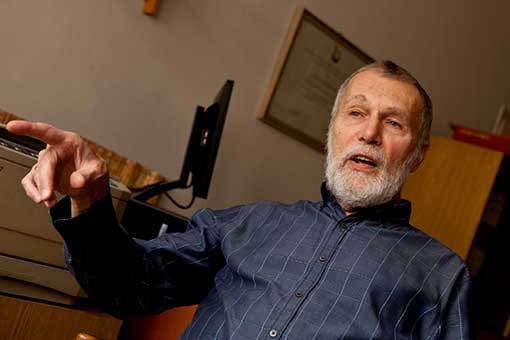



























No comment added yet..